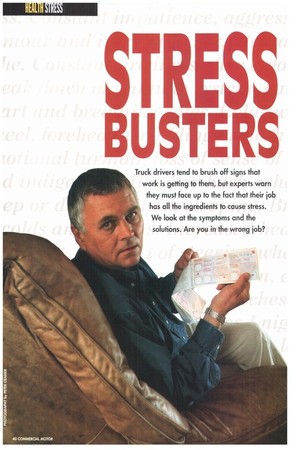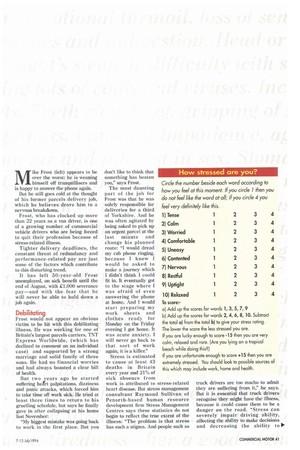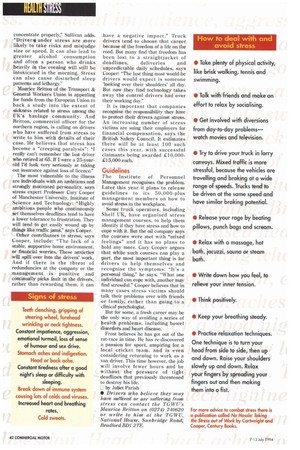STRESS
Page 42

Page 43

Page 44

If you've noticed an error in this article please click here to report it so we can fix it.
BUSTERS
Truck drivers tend to brush off signs that work is getting to them, but experts warn they must face up to the fact that their job has all the ingredients to cause stress. We look at the symptoms and the solutions. Are you in the wrong job?
Mike Frost (left) appears to be over the worst: he is weaning himself off tranquillisers and is happy to answer the phone again.
But he still goes cold at the thought of his former parcels delivery job, which he believes drove him to a nervous breakdown.
Frost, who has clocked up more than 22 years as a van driver, is one of a growing number of commercial vehicle drivers who are being forced to quit their profession because of stress-related illness.
Tighter delivery deadlines, the constant threat of redundancy and performance-related pay are just some of the factors which contribute to this disturbing trend.
It has left 50-year-old Frost unemployed, on sick benefit until the end of August, with £1,000 severance pay—and with the fear that he will never be able to hold down a job again.
Debilitating
Frost would not appear an obvious victim to be hit with this debilitating illness. He was working for one of Britain's largest parcels carriers, TNT Express Worldwide, (which has declined to comment on an individual case) and supported by a strong marriage and solid family of three sons. He had no financial worries and had always boasted a clear bill of health.
But two years ago he started suffering heKrt palpitations, dizziness and panic attacks, which forced him to take time off work sick. He tried at least three times to return to his gruelling schedule, but says he finally gave in after collapsing at his home last November: "My biggest mistake was going back to work in the first place. But you don't like to think that something has beaten you," says Frost.
The most daunting part of the job for Frost was that he was solely responsible for deliveries for a third of Yorkshire. And he was often agitated by being asked to pick up an urgent parcel at the last minute and change his planned route: "I would dread my cab phone ringing, because I knew I would be asked to make a journey which I didn't think I could fit in. It eventually got to the stage where I was afraid of even answering the phone at home. And I would start preparing my work sheets and clothes ready for Monday on the Friday evening I got home. It was acute anxiety. I will never go back to that sort of work again, it is a killer."
Stress is estimated to cause at least 43 deaths in Britain every year and 21% of sick absence from work is attributed to stress-related heart disease. But stress management consultant Raymond Sullivan of Penarth-based human resource development firm Stress Management Centres says these statistics do not begin to reflect the true extent of the illness: "The problem is that stress has such a stigma. And people such as truck drivers are too macho to admit they are suffering from it," he says. But it is essential that truck drivers recognise they might have the illness, because it could cause them to be a danger on the road. "Stress can severely impair driving ability, affecting the ability to make decisions and decreasing the ability to concentrate properly," Sullivan adds. "Drivers under stress are more likely to take risks and misjudge size or speed. It can also lead to greater alcohol consumption and often a person who drinks heavily in the evening will still be intoxicated in the morning. Stress can also cause disturbed sleep patterns and lethargy."
Maurice Britton of the Transport & General Workers Union is appealing for funds from the European Union to back a study into the extent of sickness related to stress among the UK's haulage community. And Britton, commercial officer for the northern region, is calling on drivers who have suffered from stress to write to him with details of their case. He believes that stress has become a "creeping paralysis": "I really can't remember the last driver who retired at 65. If! were a 25-yearold I'd look very seriously at taking out insurance against loss of licence."
The most vulnerable to the illness are individuals with an ambitious and strongly motivated personality, says stress expert Professor Cary Cooper of Manchester University, Institute of Science and Technology: "Highly ambitious people who continuously set themselves deadlines tend to have a lower tolerance to frustration. They will tend to get easily wound up by things like traffic jams," says Cooper.
Other contributors to stress, says Cooper, include: "The lack of a stable, supportive home environment, or financial worries. These anxieties will spill over into the drivers' work. And if there is the threat of redundancies at the company or the management is punitive and continually picks fault in the drivers, rather than rewarding them, it can have a negative impact." Truck drivers tend to choose that career because of the freedom of a life on the road. But many find that freedom has been lost to a straightjacket of deadlines, deliveries and unpredictable daily schedules, says Cooper: "The last thing most would-be drivers would expect is someone 'looking over their shoulders' all day. But now they find technology takes away the control drivers had over their working day."
It is important that companies recognise the responsibility they have to protect their drivers against stress. An increasing number of stress victims are suing their employers for financial compensation, says the British Safety Council. It estimates there will be at least 100 such cases this year, with successful claimants being awarded £10,000£15,000 each.
Guidelines
The Institute of Personnel Management recognises the problem. Later this year it plans to release guidelines to its 50,000-plus management members on how to avoid stress in the workplace.
Some truck operators, including Shell UK, have organised stress management courses, to help them identify if they have stress and how to cope with it. But the oil company says the courses were met with "mixed feelings" and it has no plans to hold any more. Cary Cooper argues that while such courses can play a part, the most important thing is for drivers to help themselves and recognise the symptoms: "It's a personal thing," he says. "What one individual can cope with, another may find stressful." Cooper believes that in many cases stress victims should talk their problems over with friends or family, rather than going to a clinical psychologist.
But for some, a fresh career may be the only way of avoiding a series of health problems, including bowel disorders and heart disease.
Frost believes he has got out of the rat-race in time. He has re-discovered a passion for sport, umpiring for a local cricket team, and is even considering returning to work as a van driver. This time however, the job will involve fewer hours and be without the pressure of tight deadlines that previously threatened to destroy his life.
L. by Juliet Parish • Drivers who believe they may have suffered or are suffering from stress can contact the TGWU's Maurice Britton on (0274) 740620 or write to him at the TGWU, National House, Sunbridge Road, Bradford BD1 2TE.
































































































